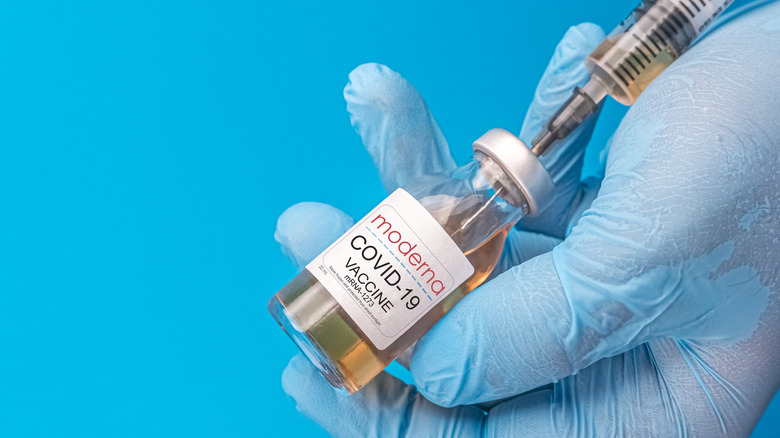What We Know About Moderna's Combination Vaccine For COVID-19 And The Flu
COVID-19 booster shots are coming soon, and they will likely become a yearly thing, like an annual flu shot. The United States Department of Health and Human Services (HHS) and medical experts released a joint statement in August 2021 saying that the COVID-19 vaccines in the U.S. are effective at "reducing risk of severe disease, hospitalization, and death, even against the widely circulating Delta variant." However, the effectiveness of vaccines reduces over time after the first two shots, especially with respect to mild to moderate illness from the virus and with people who are at a higher risk. So there's a conclusion that booster shots are needed.
Moderna and Pfizer, both makers of the mRNA vaccines, plan to offer booster shots, but will have to wait for FDA and CDC approval. According to the CDC, the booster shots will be ready this fall, so anytime now. The booster shots will be made available to individuals eight months after they are fully vaccinated with Pfizer or Moderna. For example, you're fully vaccinated two weeks after your second shot, so if you received your last vaccine dose in March 2021, you would be eligible for a booster shot in October 2021.
Moderna plans to simplify things for medical staff and patients by combining the booster shot with the flu vaccine.
Moderna's combination vaccine
Moderna is working on a combination vaccine for COVID-19 and the flu, making the vaccines more convenient for medical staff and patients, since many people already get a booster flu shot every year. You could get a combination booster vaccine for COVID-19 and influenza simultaneously with one go, instead of having to get both at the same time or at different times from different locations. That will cut down on supply costs for medical companies as well. Moderna's single vaccine will offer protection against COVID-19 and influenza (via Moderna).
Flu season occurs in the winter, because people typically spend more time indoors and are more likely to catch a respiratory illness. That's why the timing of the combination flu and COVID-19 vaccine would work well. You could get protection from both in one shot right before flu season (via Healthline).
Combination vaccines aren't new — the DTaP vaccine protects against diphtheria, tetanus, and pertussis, and the MMR vaccine protects against measles, mumps, and rubella. According to Reuters, Moderna could start testing a combination vaccine within the next six to 12 months.


